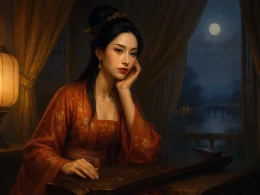The River Xiang unruffled in autumn looks wide;
The wayfarer at moonset leaves the riverside.
We see wayfarers come, we see wayfarers go.
Over white duckweed partridges fly to and fro.
Original Poem
「湘江曲」
张籍
湘水无潮秋水阔,湘中月落行人发。
送人发,送人归,白蘋茫茫鹧鸪飞。
Interpretation
Composed during the mid-Tang Dynasty while Zhang Ji was traveling or serving in southern China, this lyric poem belongs to the tradition of folk-style "yuefu" poetry. As one of the leading poets following the "Ten Talents of the Dali Era," Zhang Ji frequently explored themes of travel and separation. This particular work, collected in the Anthology of Yuefu Poetry under "Miscellaneous Songs," captures a farewell scene along the Xiang River in Hunan province—where autumn waters stretch vast, duckweed blankets the surface, and the mournful cries of partridges have long symbolized parting sorrows.
First Couplet: « 湘水无潮秋水阔,湘中月落行人发。 »
Xiāng shuǐ wú cháo qiū shuǐ kuò, Xiāng zhōng yuè luò xíngrén fā.
Autumn's Xiang River, tide-less, stretches wide; The moon descends—the traveler must depart.
The opening lines establish the farewell's temporal and spatial setting. "Tide-less" conveys the river's stillness, while "stretches wide" suggests its vast emptiness—a quiet counterpoint to the speaker's inner turmoil. "Moon descends" marks the predawn moment of parting, where fading night and impending separation compound the melancholy.
Second Couplet: « 送人发,送人归,白蘋茫茫鹧鸪飞。 »
Sòng rén fā, sòng rén guī, bái pín mángmáng zhègū fēi.
I send you off, then turn back alone— To endless duckweed and partridges in flight.
Here, the poem's emotional core emerges through deceptively simple language. The mirrored phrases "send you off/turn back" create a rhythmic pendulum of departure and return. "Endless duckweed" paints a visual tapestry of floating plants—ephemeral and directionless—while the partridges' flight adds auditory melancholy. Together, these elements weave stillness and motion into a poignant meditation on separation.
Holistic Appreciation
"Song on River Xiang" depicts farewell throughout without explicit expressions of parting sorrow. The poet skillfully conveys emotions through scenery, achieving perfect integration of feeling and scene. The opening lines create a tranquil, chilly morning farewell setting, with the vast river and autumn moon sinking westward, mirroring the loneliness of those seeing off. The latter lines intensify emotionally—"seeing someone off at departure, seeing someone off at return"—using repetitive phrasing to create echoing emotional resonance, rich in musicality. "White duckweeds stretching vast, partridges flying" superimposes visual and auditory imagery, enriching the poetic conception. Without directly stating sorrowful parting, every line carries deep emotion, with profound melancholy surging beneath the seemingly calm description.
The poem features simple language, compact structure, and serene artistic conception, showcasing Zhang Ji's meticulous craftsmanship as a yuefu poet and his mastery of rhythm and imagery. The closing line "White duckweeds stretching vast, partridges flying" combines concrete and abstract elements with restrained richness, not only echoing the opening scene but also adding lingering charm with its "sound-and-scene ending," creating powerful emotional reverberation.
Artistic Merits
The poem employs plain yet natural language while skillfully using rhetorical devices like anadiplosis and repetition. The cyclical "seeing someone off at departure, seeing someone off at return" enhances both rhythm and emotional resonance. Throughout, scene and emotion blend perfectly—through descriptions of riverside views like "autumn waters wide," "white duckweeds stretching vast," and "partridges flying," the melancholy of farewell is projected onto tranquil yet dynamic imagery. Strong local color emerges through vivid Xiang River imagery—white duckweeds and partridges distinctly outline the unique southern waterscape, giving the poem both regional charm and lyrical quality. This reflects Zhang Ji's artistic characteristics in yuefu poetry: unadorned yet subtle, graceful and melodious.
Insights
This poem reveals that the most genuine emotions often reside in the simplest phrases and most delicate scenery. Using the most ordinary expressions, Zhang Ji sketches a farewell dawn, ingeniously blending longing, solitude, and melancholy into the landscape. Without a single explicit mention of parting sorrow, every line touches the heart profoundly. This subtle lyrical approach not only embodies the ancient aesthetic of "deep emotion without ostentation" but also provides contemporary literary creation with a model—that only through authentic scenes, nuanced sensations, and rhythmic language can we express profound emotions capable of moving hearts across time.
Poem translator:
Xu Yuan-chong (许渊冲)
About the poet:
Zhang Ji (张籍), c. 768 - c. 830 AD, was a native of Suzhou, Jiangsu Province. He entered the academy in 798 AD. His poetry is best characterized by its condensed yet simple and natural language.












